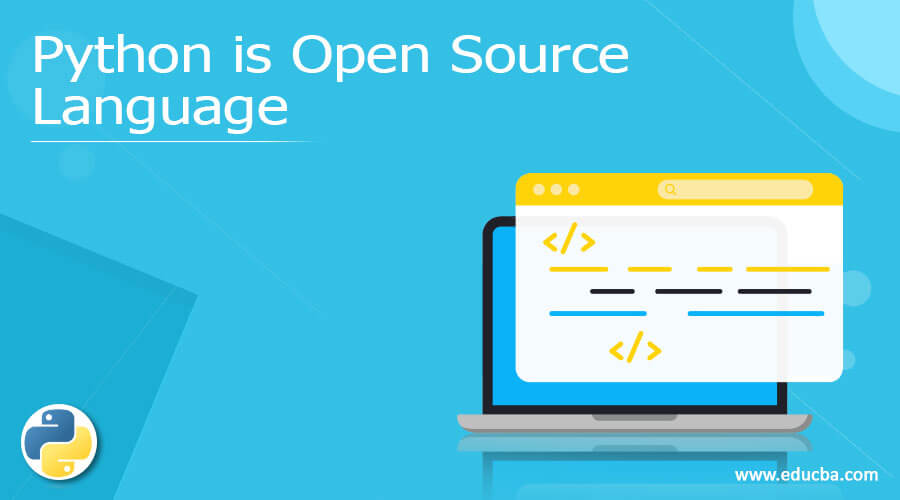Updated September 30, 2023
Introduction to Python
Python is a high-level, interpreted, interactive, and object-oriented programming language. Python is designed to be highly readable. It has fewer syntactical constructions like the English language than other programming languages.
Table of Contents
- Introduction
- Is Python Open Source?
- Features
- Where we Used
- Real-time Examples
- How do you contribute?
Is Python Open Source?
Yes, Python is an open-source language, which means it is free and available for everybody to use for any purpose. The Python software foundation manages the Python language. An OSI-approved open-source license was developed, making it freely available, usable, and distributable.
The Open Source Initiative (OSI) is a California public benefit corporation with 501(c)3 tax-exempt status, founded in 1998. Guido van Rossum developed Python at the National Research Institute for Mathematics and Computer Science in the Netherlands in the late eighties and early nineties.
Refer to the below link for more information about Python History and License.
https://docs.python.org/3/license.html
Features of Python Open Source Language
Below are the different features as follows:
- Interpreted: The interpreter processes Python code at runtime. No need to compile the program before executing it.
- Interactive: Python can run in interactive mode, where you write code in a command line shell that provides immediate output for each statement.
- Cross-platform Language: Python works on different platforms like Windows, Linux, Mac, etc.
- Ease to Learn: Python is easy to learn and easy to use; it is developer-friendly.
- Expressive: Python is easy to read and understand. The syntax of Python is like English statements.
- The large set of Libraries: Python provides a large set of libraries, modules, and functions that enable the rapid development of applications.
- GUI Support: Python supports the development of a Graphical User Interface.
- Integrated: You can easily integrate Python with other languages like Java, C/C++, etc.
- Databases: Python provides interfaces for a large set of databases.
- Free and open source: Python is freely available on the official website. Anybody can use it, modify it, and re-distribute it. But the Python language is copyrighted.
- Object-Oriented: Python supports an object-oriented style of programming that encapsulates code within the object.
- Datatypes: Python has various basic data types like integers, floating point numbers, String (both in ASCII and Unicode), lists, dictionaries, etc.
- Modules and Packages: You can group code into packages and modules.
- Error Handling: It supports throwing and catching exceptions, which results in cleaner error handling.
- Memory Management: Automatic memory management deallocates the memory instead of manually handling it in the code.
- Dynamically Typed: Datatypes are strongly and dynamically typed; Converting a variable from one datatype to another causes an exception, so the system catches errors at the earliest possible stage.
- Advanced features: Python contains advanced features like generators and list comprehensions.
Where is Python Open Source Language Used?
Python, an open-source and versatile programming language, finds extensive application across various software development domains. Here are some examples as follows:
- Console-Based Application: You can use Python to develop console-based applications.
- Web Applications: Developers can use Python to create web applications. It provides libraries that handle protocols like HTML, XML, JSON, and requests. It offers various frameworks for web application development, such as Django, Pyramid, etc.
- Desktop GUI Application: Python provides frameworks like Kivy, PyQt, Tkinter PyGUI, etc., for developing desktop GUI applications.
- Scientific and Numeric Computing Applications: Python provides various libraries and packages like SciPy, Pandas, IPython, etc., for developing numeric and scientific computations using Python.
- Business Applications: People use Python to develop business applications like ERP and e-commerce.
- Audio or Video-based Applications: Python can develop multimedia applications that include images, audio, and videos to create cartoons, etc. Some of the real-time applications are TimPlayer, play, etc.
- Machine Learning Applications: Python contains special libraries for machine learning, namely scipy, and numpy, which are great for linear algebra and learning kernel machine learning methods.
Real-time Examples of Python
Various companies are widely using Python as a code base for developing their applications or products. Below mentioned are a few examples.
Google, DropBox, NetFlix, Instagram, Splunk, BuzzFeed, FaceBook, Spotify, and many more companies use Python for their development.
Python Versions
The first version of Python was released as Python 1.0 in 1994. Now, the latest version is Python 3.10.6, released in August 2022. From Python 1.0 to 3.10, various new features and enhancements to the existing features are being made.
How do you contribute to Python?
Since Python is open source, you can contribute to Python by submitting any modules or applications, raising bugs, or even providing fixes. To contribute, you can submit your work to the official Python sites. Some of them are mentioned below.
- To report a bug, use the link https://bugs.python.org/
- To contribute to the official Python documentation, join the Documentation SIG, write to [email protected], or use the Issue Tracker to contribute a documentation patch.
- To announce your module or application to the Python community, refer to this guide Posting guideline. Refer to the guide on Python mailing lists for more information.
- Read the Python Developer’s Guide for more information about Python’s development process to contribute to a bug fix or other patch to the Python core.
- To propose changes to the Python core, refer to this guide, CompLangPython, to post your thoughts. If you have an implementation, follow the Python Patch Guidelines.
Conclusion
We now know that Python is a robust programming language with widespread usage. Learning and implementing Python is easy, and it facilitates concise code writing. Python enables the development of a wide range of applications. You can access various tutorials to learn Python and choose any of them to become proficient in Python.
Recommended Articles
We hope this EDUCBA information on “Is Python open source” benefits you. You can view EDUCBA’s recommended articles for more information.




